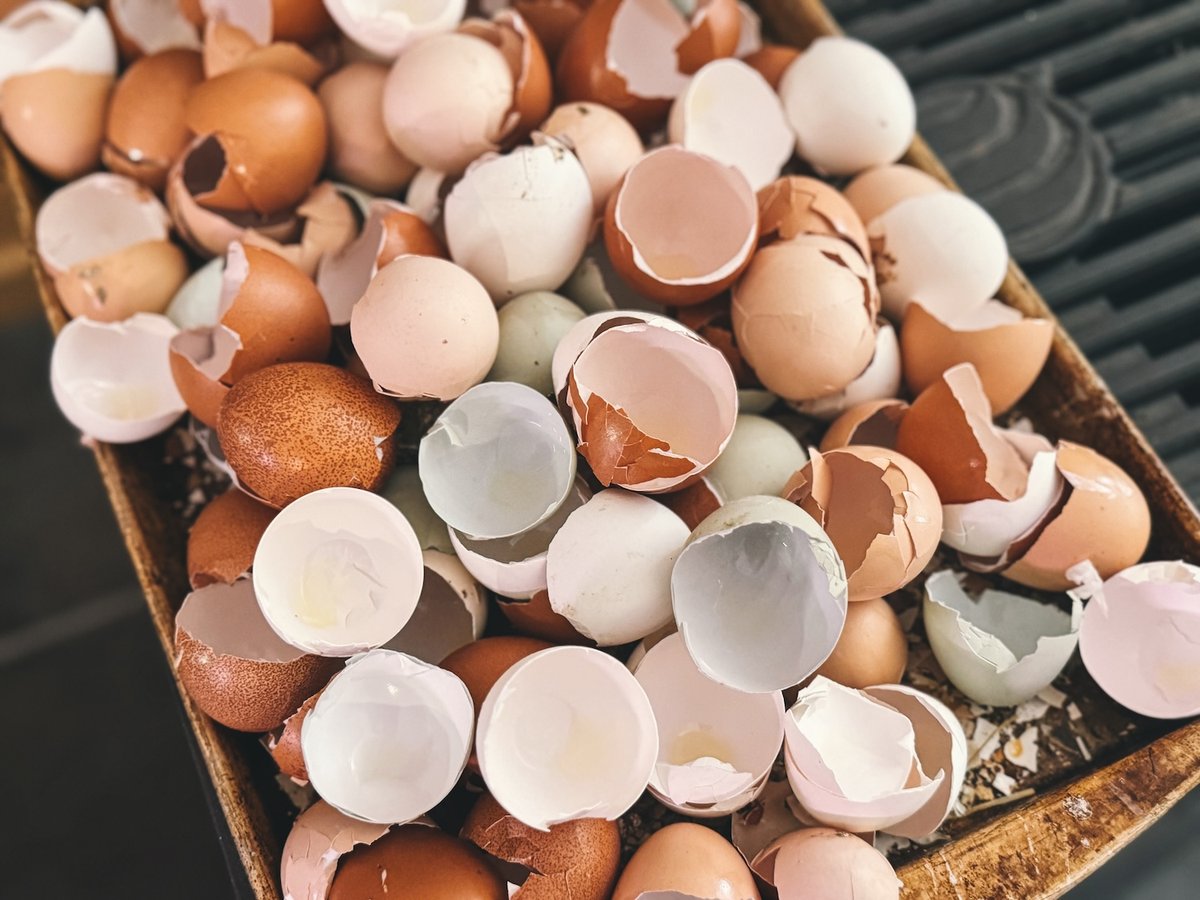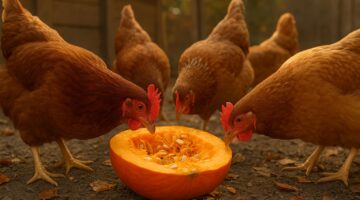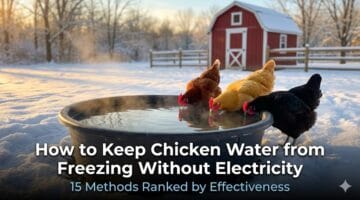There are few things more frustrating for a chicken keeper than heading out to the coop expecting fresh eggs, only to find a sticky, broken mess. I’ve been there, and I know how disheartening it can be. The good news is that this is a problem you can solve. This article covers common causes and provides a guide on how to stop chickens from eating their own eggs.
Is It Bad if Chickens Eat Their Own Eggs?
Yes, this is a bad habit to allow. The behavior is destructive for a few reasons. First, you lose valuable eggs. Second, the chickens eating their own eggs habit can spread quickly through your entire flock. One hen can teach the others that eggs are a food source, and soon you will have a problem that’s much harder to solve.
This issue is frustrating, but it is solvable. By understanding the root causes, you can stop the behavior before it becomes a major problem. Let’s examine why chickens eat their eggs so we can address the problem head-on.
The Root Causes: Why Do Chickens Eat Their Own Eggs?
To find a solution, I’ve learned you must identify the root cause of the problem. It often comes down to a few factors you can control. This is not malicious behavior, but a sign something in their diet or environment needs to be adjusted.
1. Nutritional Deficiencies
A chicken’s diet is the foundation of its health. If it’s lacking something important, your hens will find it elsewhere—even in their own eggs. This common nutritional deficiency is the leading reason for broken eggs in the coop.
- Calcium Deficiency: A hen’s body uses a tremendous amount of calcium to create strong eggshells. If her diet lacks this essential mineral—a condition known as calcium deficiency—she’ll produce eggs with thin, weak shells that can break easily in the nesting box. Once a hen tastes a broken egg, it can become a delicious habit. This makes understanding how to increase calcium in chickens a vital first step. In my experience, the single most effective fix is providing free-choice crushed oyster shells. I keep a separate feeder full of it at all times, and it solves shell quality issues almost overnight. You can also provide finely crushed, baked eggshells as a supplement.
- Protein Deficiency: Protein is a critical nutrient for a chicken’s overall health and for producing eggs. If a chicken is not getting enough from her feed, her body will crave it, and she’ll be naturally drawn to the high protein content of her own eggs. I always make sure I’m providing a high-quality layer feed with a protein content of at least 16% (according to poultry nutrition experts).
- Dehydration: Hens need a constant supply of fresh water to produce eggs. If a hen is thirsty, she may peck at an egg for moisture. I always check that my flock’s water source is clean and full, especially on hot days.
2. Environmental Issues and Boredom
The environment within the coop and run also plays a major role in a hen’s behavior. A happy chicken is a healthy chicken, and a bored or stressed chicken can develop bad habits. I’ve found this issue is a common problem in both backyard chickens and large-scale poultry farming.
- Stress and Boredom: A stressful environment, often caused by too many birds in a small space, can lead to abnormal behaviors like aggression and egg-eating. The pecking order can also be a source of stress, especially for younger or weaker hens. When chickens are bored, I’ve seen them get into all sorts of trouble. Pecking at things is a natural behavior, and if there isn’t enough to keep them occupied, they might get curious and start pecking at the eggs in their nesting box.
- Nesting Box Conditions:Hens need a private, comfortable, and dark place to lay their eggs. A poorly designed nesting box can lead to problems. Key issues to check for are:
- Too much light: Hens prefer dark, secure spaces.
- Shallow bedding: Eggs can break easily without a deep cushion.
- Not enough privacy: Curtains or a secluded location reduce stress.
Sometimes, the behavior starts with a simple accident, and once it begins, it is tough to stop. Before you can fix the problem, you need to identify the culprit.
How to Tell Which Chicken is Eating the Eggs
Identifying the culprit in a large flock can be a challenge. I’ve found that while you could watch your coop all day, there are a few clever tricks to catch the offender and stop the behavior before it spreads. This is an important step for effective flock management in backyard chickens.
The Obvious Clue: A Messy Beak
The simplest sign I’ve found is dried yolk and shell stuck to a hen’s beak, face, or chest feathers. I usually check a few hours after I notice the broken eggs, as the yolk will have dried and become more noticeable. A hen who has been eating eggs will likely have a sticky, yellow residue that’s difficult to hide.
How to Catch the Culprit Without Watching All Day
- The Trap Nest Method: For a more definitive answer, you can use a “trap nest,” a special type of nesting box that allows a hen to enter but not leave. When you check the nest and find an egg-eating hen inside, you’ve found your culprit. I’ve seen these be very effective when you know which hen is laying at what time of day.
- The Food Coloring Trick: A harmless method I’ve used is to inject a small amount of brightly colored food coloring (like red or blue) into a decoy egg using a syringe. Place it in the nesting box. The hen with the brightly colored beak or feathers is your culprit. This works best when you have a small flock and can easily spot the colored beak.
Once you identify the guilty party, you can take a more targeted approach. Let’s look at a concrete action plan for how to stop chickens from eating their own eggs and getting your egg production back on track.
How to Stop Chickens from Eating Their Own Eggs: A 7-Step Action Plan
Once you’ve identified the potential cause, you can implement a clear plan to solve the problem. Consistency and patience are key! I’ve found that this plan starts by addressing the most common culprit: their diet. The solution to what to feed chickens when they are eating their eggs begins here.
Step 1: Address Nutritional Issues
- Provide a High-Quality Layer Feed: Ensure your chickens are on a high-quality layer feed with 16-18% protein. This provides a balanced diet that should prevent them from seeking additional nutrients.
- Offer Free-Choice Calcium: This is essential. I always provide a separate, free-choice bowl of crushed oyster shells. I never mix it into the feed. Hens will instinctively eat the amount they need, and this is the easiest way to ensure they have enough calcium and provide them with the nutrients for strong shell strength.
- Check for Strong Eggshells: Before you assume it’s a habit, check the thickness of your eggshells. Thin, brittle, or soft-shelled eggs are a clear sign of a calcium deficiency. A strong shell is less likely to break in the nesting box, preventing the taste that often starts the problem.
Step 2: Collect Eggs Frequently
A simple but effective solution. I find the less time eggs spend in the nesting box, the less likely they are to be broken and eaten. I collect my eggs at least twice a day, especially in the morning when most hens are laying. If you have a known offender, try to check the nests every few hours to prevent the habit from being reinforced.
Step 3: Perfect Your Nesting Boxes
Hens feel most secure laying in a private, dark space. Providing dark nesting boxes is a key part of good animal husbandry.
- Make them dark and private: I recommend adding curtains or flaps to the front of the nesting boxes to create a secure, hidden space. This also makes the eggs less visible to curious hens.
- Use plenty of bedding: Ensure there is deep, soft bedding (like pine shavings or straw) to cushion the eggs and prevent accidental breakage.
- Provide enough boxes: The rule of thumb is one nesting box for every 4-5 hens to prevent overcrowding and stress.
Step 4: Use Decoy Eggs to Break the Habit
If the problem is a learned habit, I’ve found you can use dummy eggs to deter the hen. When she pecks at a hard, unrewarding object like a ceramic egg or a golf ball, she will eventually get frustrated and give up. Place these decoys in the nesting boxes to reinforce that eggs are not a food source.
Step 5: Address Boredom and Stress
Give your flock plenty of enrichment activities. A busy chicken is a happy chicken.
- Chicken Enrichment Ideas:
- Hang a cabbage or a head of lettuce on a string for them to peck at.
- Add new perches and things to climb on.
- Scatter scratch grains or corn around the coop to encourage natural foraging.
- Provide plenty of space to roam in the run.
Step 6: Consider Roll-Away Nesting Boxes
For a long-term, highly effective solution, I’ve seen roll-away nesting boxes work wonders. These are designed so that as soon as a hen lays her egg, it gently rolls into a safe, separate compartment where she can’t reach it. This completely removes the opportunity for egg-eating.
Step 7: When All Else Fails: Culling
This is a last resort. If you have tried all other methods and have a persistent offender that is teaching the rest of your flock this destructive habit, most experts… agree that with a solid action plan, you can break the habit without having to take this extreme step.
With this guide, you have the tools I’ve used to solve the problem and get your egg production back on track.
Common Questions and Myths (FAQ)
Does mustard stop chickens from eating eggs?
Mustard is a popular backyard chickens myth. I’ve seen many people try it, hoping the flavor will deter their chickens. While some may be put off, many chickens don’t mind the flavor due to their different taste receptors. It’s not a guaranteed fix, but it can be worth a try as a short-term deterrent.
Can chickens eat their own eggs cooked?
Yes, absolutely. Cooked eggs, like scrambled eggs, are a fantastic, protein-rich treat for chickens. The key is that this does not teach them to look for raw eggs in the nesting box. You are giving them a prepared treat, not a lesson in how to access their own eggs.
Can debeaking prevent egg-eating?
Debeaking is an extreme and often painful practice typically used in commercial poultry farming to prevent cannibalism and aggression in crowded conditions. It is not recommended for backyard chickens as a solution for egg-eating. Proper flock management is the humane solution.
Is it safe to feed eggshells back to chickens?
Yes, it is a great way to supplement their calcium. However, it’s crucial to bake the eggshells first to sterilize them and then crush them into very small, unrecognizable pieces. If the pieces are too large, the hens might associate them with the whole egg, reinforcing the egg-eating habit. I always provide crushed oyster shells as a primary calcium source, separate from the feed.
Do young chicks or roosters need calcium supplements?
No, they don’t. Calcium is primarily needed for egg production. Too much calcium can be harmful to roosters and young chicks, causing bone and kidney issues. I only provide calcium supplements in a separate container for my laying hens to eat free-choice, as they instinctively know when they need it.
Conclusion: A Future Free of Eaten Eggs
Ultimately, egg-eating is a problem you can solve. It’s your flock’s way of telling you that something in their diet or environment needs a small adjustment. By focusing on the three pillars of prevention—excellent nutrition (especially free-choice calcium), frequent collection, and secure nesting boxes—you can put an end to this frustrating habit and get back to enjoying the fresh, whole eggs you work so hard for.

Oladepo Babatunde is the founder of ChickenStarter.com. He is a backyard chicken keeper and educator who specializes in helping beginners raise healthy flocks, particularly in warm climates. His expertise comes from years of hands-on experience building coops, treating common chicken ailments, and solving flock management issues. His own happy hens are a testament to his methods, laying 25-30 eggs weekly.



